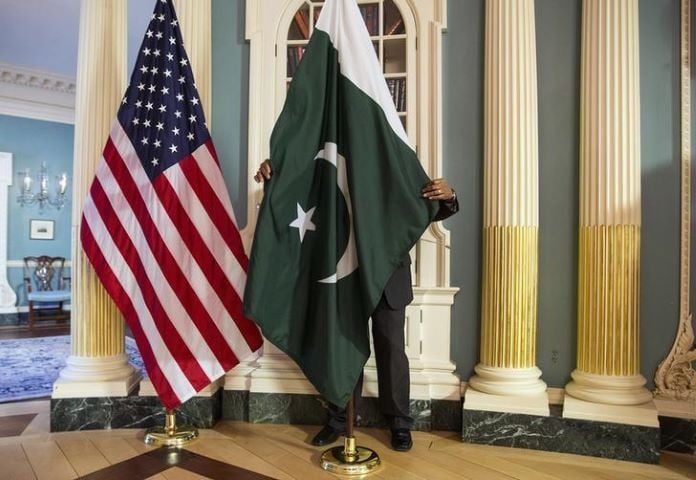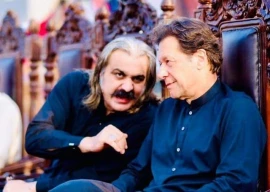
The United States government looks forward to continuing its robust cooperation with Pakistan to address the issues of illegal trade of drugs, narcotics and weapons to safeguard the region as well as the communities of the world.
“We have found Pakistan to be a great partner across the board and we have to rely even more on Pakistan since we are not in Afghanistan anymore to counter illegal trade of drugs, narcotics and weapons trafficking,” US Assistant Secretary of State for International Narcotics and Law Enforcement Affairs Todd D Robinson said in an exclusive interview with The Express Tribune.
Robinson said that Pakistan had proven to be an able (not enabling) partner because they knew the issues and the territories.
“We can help them in training and equipment to do a really dangerous job,” he said. “I take my hat off to Pakistani partners. They are in many respects safeguarding the region and communities of the world.”
He was on a visit to Pakistan to celebrate 40 years of the presence and cooperation with Pakistan by State Department’s Bureau of International Narcotics and Law Enforcement Affairs and the 75th anniversary of bilateral relations between Pakistan and the US.
The US State Department, through the Bureau of International Narcotics and Law Enforcement Affairs (INL), spends more than $21 million on programmes in Pakistan each year for cooperation regarding counter-narcotics to community policing.
About maritime crime in the region, Robinson said the US and Pakistan have a mutual interest in securing Pakistan’s seaports and the Indian Ocean from illicit trafficking.
“We recognise that most of the heroin smuggled from Afghanistan transits through Pakistan’s seaports and along the Makran coast in Balochistan to international markets, and we look forward to continued partnerships in bolstering maritime security in the Indian Ocean,” Robinson said.
Pakistan Navy is contributing to the fight against narcotics as part of the Combined Task Force-150 mission. In April, a Pakistani naval vessel seized illicit narcotics while conducting patrols in the Gulf of Oman. “We greatly value these efforts,” he added.
Read US backed regime change as it ‘wants bases in Pakistan’
He said that the US programmes support civilian law enforcement, rule of law, corrections and counter-narcotics to help Pakistan combat violent extremism, expand access to justice, and enforce the rule of law nationwide.
In support of the Federally Administered Tribal Areas reforms, the US refocused programmes on expanding law enforcement and justice sector systems in areas where criminal and extremist networks thrive, including supporting the recruitment and retention of women in law enforcement.
“Our assistance is especially important in the districts along the Afghanistan border, as Pakistan transitions that area to civilian governance and introduces mainstream Pakistani concepts of law and policing,” he added.
Regarding countering narcotics trafficking, he said that INL provides training and equipment to Pakistan’s counter-narcotics units to scale up interdiction efforts along the border with Afghanistan and southern coastal areas along major trafficking routes used by transnational terrorist and criminal organisations.
Regarding the role of INL programmes to eradicate drugs and eliminate the supply, he said, “I want to congratulate the Pakistani law enforcement agencies on seizing 38 metric tonnes of opium-based narcotics in 2021, as reported by the Anti-Narcotics Force.”
Because of the close collaboration between the US Department of State, the US Drug Enforcement Administration, and “our Pakistani counterparts, like the Anti-Narcotics Force’s Special Investigation Cell, Pakistan has denied record levels of revenue to drug-trafficking organisations since September 2021”, he added.
To date, the US has invested $24 million in drug treatment and prevention efforts in Pakistan, and this could not have been achieved without our close partnerships with the MNC, provincial-level partners, UNODC, and the Colombo Plan, Robinson said.
He underscored that poppy cultivation has been reduced by 87% in areas where the US works with the Pakistani authorities on crop control projects.
Read more Pakistan’s exports to US increased during ‘regime change operation’
“We do this by educating farmers about high-value, legal crops and then helping them get their legal products to market. More than 365,000 families have received assistance through these programmes,” he added.
About the US support to the rule of law in Pakistan, he said the state department’s rule of law programme supports professional development programmes, primarily for prosecutors and judges, provides some material assistance, and conducts training to build the capacity of the criminal justice sector.
He said that the INL plans to continue offering training as well as exchange and virtual programmes to further develop a more professional justice sector. The INL, he said, is also funding the construction and curriculum development for the first-ever Prosecution Academy in Khyber-Pakhtunkhwa, which he joined in inaugurating with Pakistani partners and government officials during this visit.
He emphasised participation of women in the judicial system, welcoming Pakistan in celebrating its first female Supreme Court justice this past year. “We look forward to seeing more women advance throughout the criminal justice sector and other public service fields here,” he added.
He said that promoting gender equity and equality is a longstanding cornerstone of the US foreign policy. The INL gender programmes focus on elevating female voices and strengthening access to opportunities.
“One thing I am most proud of is that INL has trained more than 4,200 policewomen in partnership with Pakistan’s police agencies,” he said, adding that this improves community-police relations and protects policewomen from violence. The INL corrections programming aims to help Pakistan develop a safer, more secure, and more humane prison system.
“We have been working on this since 2010, and currently have programmes in Balochistan, Sindh, K-P and Punjab,” he said.
Since January 2012, 325 Pakistani corrections officials belonging to four provincial prisons departments have completed ICMTC training.
Also read US Assistant Secretary Robinson in Pakistan
About the recent programme success stories, he informed about the completion of a $5 million infrastructure project at the Frontier Corps K-P North training centre in Warsak and the beginning of a new $4.6 million construction project, which will provide women’s facilities at eight Frontier Corps K-P South district headquarters.
In 2018, the INL initiated a programme to address these challenges, donating more than $10 million for the construction of barracks and other facilities for women at 14 law enforcement training locations throughout Pakistan.
Earlier this year, the INL successfully transferred one such facility to Pakistan’s National Highways and Motorway Police (NHMP). The new barracks can accommodate 100 female trainees and includes a dining hall, lactation room, and daycare facilities. Over the next five years, the facility will help the NHMP meet its goal of adding 1,200 new female officers, comprising 10% of all new recruits.


















COMMENTS (1)
Comments are moderated and generally will be posted if they are on-topic and not abusive.
For more information, please see our Comments FAQ